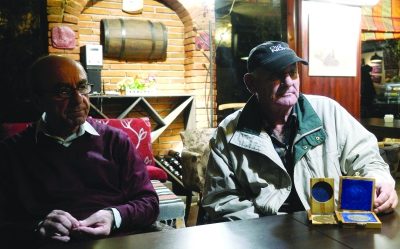Will Kristallnacht be forgotten, relegated to the ash heap of Jewish history, akin to the Kishinev Pogroms, which, let’s face it, no one really talks about anymore — even though they were a turning point in Russian Jewry, informing Russian Jews that their days in the Pale of Settlement were numbered, and instigating them to look elsewhere for life and prosperity. Many — in the hundreds of thousands — arrived on these shores.
It appears that, 77 years after that fateful night, there’s a real danger of that happening. As much as Holocaust awareness and education is growing, it seems that, conversely, knowledge of anti-Jewish events in Germany prior to the Holocaust is diminishing. Example: In the past, our Community Calendar included multiple Kristallnacht commemorations. This year, there’s only one: In Santa Fe, Tabbi Yitzchak Mendel Wagner, the first ordained rabbi born in Germany after the Holocaust, will discuss contemporary German Jewish life. In Denver, the ostensible capital city of the intermountain area, there is, to our knowledge, no remembrance event.
November 9, the anniversary of Kristallnacht, falls during the General Assembly of Jewish Federation’s of North America, which the IJN will be attending. According to the published program, there is not a single commemoration event taking place at the GA.
As we have remarked elsewhere on this blog, the single night that was Kristallnacht has become eclipsed by the enormity of the Holocaust that followed. Yet failing to mark Kristallnacht as a singular event is a perilous development. For Kristallnacht is key to trying to answer that ever elusive question: How? We utter “Never again,” but without understanding how the Holocaust happened, how can we ever be expected to prevent a recurrence? Kristallnacht was both a culmination, as well as a harbinger. It was the result of the world choosing to ignore the concomitant strains of racial hatred and military expansion, essentially giving a free pass to the perpetrators. And it was a prototype of what was to come: Jews removed from society, degraded, sent to concentration camps.
When we fail to commemorate Kristallnacht, we fail to remind ourselves that one night, one event, can be prescient. That total devastation begins with small steps; it doesn’t begin with the Holocaust.
The Germans realize this, which is why the nation continues to commemorate Kristallnacht. It’s also why Munich’s newly-opened Documentation Center for the History of National Socialism spends much of its exhibition showing how the Nazi party came into being, into power, and its incremental steps toward solidifying and implementing its policy of racial hatred.
I visited the museum on a trip to Germany that I made earlier this year for the 70th anniversary of the liberation of Dachau. It is a museum that seeks to truly explore the how, so that Germans today understand that the Holocaust, or the Nazis, didn’t happen in a vacuum. It required the participation of society — whether in an active form, or perhaps even more dangerous, through silent acquiescence.
Kristallnacht, it can be argued, more than any other event, showed the Nazis that their behavior would be tolerated, if not outright ignored. Look where it led. That’s a lesson that must be remembered.













Martin Luther, provided Hitler, with his hateful writings, the blue print for the holocaust. Hitler, said thank you to Martin Luther, by starting the holocaust, on Martin Luther’s
birthday November 9-10,on Krisallnacht.
Did not know that. It seems those days in German history are quite significant. The date of Kristallnacht was “celebrated” as a “holiday” by the Nazis as it was the day of Hitler’s failed coup in the 1920s.